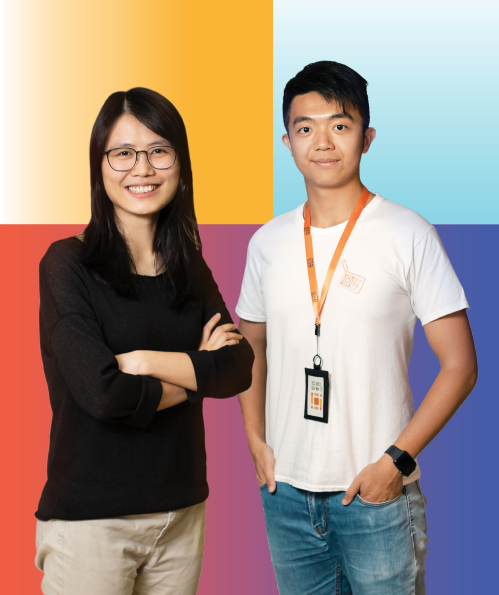
Building a better world through
love, care, and connection
Success is defined as the accomplishment of goals. And at HKUST, we gage the University’s success by our alumni’s success. With such a diverse community, it is always interesting to see the wide range of goals our alumni are working towards. Some in particular have chosen unusual career paths that have led them in unexpected directions. Here, we talk to two such alumni, Mavis Ho and Luke Tam, who have both diverged from mainstream career paths to follow their hearts and serve the community.
Mavis serves at the Hong Kong Family Welfare Society as a social worker for divorced families. Luke is the founder of Kaifong Tour, an award-winning social enterprise that promotes understanding between Hong Kong’s disparate and diverse communities. While they contribute to society in very different ways, the thread that connects them is their determination to make a positive impact.
In fact, the two first became friends through HKUST Connect, when Mavis was working as a full-time coordinator and Luke joined the Public Service Leadership Program as a student. Their unique career paths are a testament to the strong sense of social responsibility that exists within our alumni community.
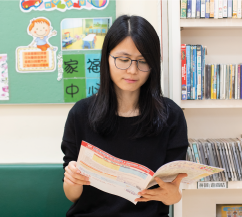
A chat with
Mavis HO
2010 BEng Chemical and
Environmental Engineering
Social Worker,
Hong Kong Family Welfare Society
A keen sense of concern
Mavis has always felt a keen sense of concern about the well-being of the planet and the people around her. She chose to study chemical and environmental engineering at HKUST, not from a pure interest in science or future-proofing her career, but from a desire to protect the environment. She saw the pollution caused by industrial development and pursued her studies with one question in mind:
How can we as humanity fulfil our needs in
a more responsible and sustainable way?
The more she studied, the more determined she was to make a difference. In 2008, Sichuan was struck by a devastating earthquake which took the lives of more than 69,000 people and left millions without shelter, food, or water. Mavis, only in her first year of university, felt the shock of this horrific incident keenly, and was desperate to help. She and her friends did what they could to raise awareness on campus and send donations to the affected areas. After that, she made sure to keep up with current affairs, not just in Hong Kong, but across the globe.
“As I learned more about the environmental problems facing the world today, I realized they all stem from human problems,” Mavis says. “And the only way to make a real difference is to address the social issues that lie at the root of everything.” In that moment, her focus shifted from math and engineering to social services. She joined the University’s Christian Fellowship to start taking action, eager to find a way for communities to live happily together without destroying the earth they live on.
Taking action
In her third year, the University started a social initiative called HKUST Connect with the aim of partnering with various organizations in advancing justice, hope, and basic goodness in the community. Based on the concept of “service-learning”, HKUST Connect helps students deepen their understanding of societal needs and how they can help disadvantaged groups through meaningful projects. One of the first projects organized was a trip to assist with teaching in Sichuan’s makeshift schools. Mavis signed up immediately.
“We visited sites that were devastated by the earthquake and I’ll never forget the suffering I saw – this time in person, not just on TV,” Mavis reflects. “I’ll also never forget the smiles on the students’ faces when we played games with them and showed them scientific experiments at school. I was amazed they could smile at all while living in such difficult conditions.”
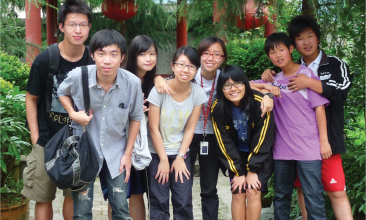
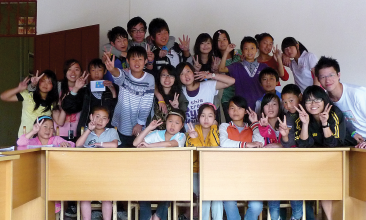
Mavis visited Sichuan three more times after that, each time doing everything she could to help the people recover, and each time reflecting on the experience. “In service-learning projects, we debrief at the end of every day with the four F’s of active reviewing: facts, feelings, findings, and future,” she explains.
This kind of self-reflection is very valuable: I started
to rethink my own perspectives. I started to see that
my actions could make a real difference. And I started
thinking about my future career.
After such unforgettable experiences in Sichuan, Mavis was convinced that service-learning was the way to go. So, after graduating, she became a full-time coordinator for HKUST Connect, keen to help students realize their own important role in making society a better place for everyone.
Becoming a leader
During her four years with HKUST Connect, Mavis was instrumental in expanding the scope of projects and changing the focus from one-off activities to long-term services for greater impact. She organized a variety of service-learning projects for students, such as visiting the elderly, helping mentally handicapped people, writing stories for cancer patients, building houses, and leading educational tours. “We created a year-long leadership training program to help students initiate and organize community activities themselves,” she says. “This program helped lay the groundwork for Connect Ace, the University’s Ambassador for Community Engagement initiative.”
One of the most memorable projects for her, which turned out to also be a steep learning curve, was a trip she organized to a school they had never worked with before in Sichuan. “It was a tough trip for many reasons,” she laughs. “Firstly, it was a very remote school and the bus journey was difficult. Secondly, there were no showers! Thirdly, we had to be ready to change our teaching schedule at a moment’s notice, because the staff were not used to working with us. Also, it was one of my first times leading students who weren’t much younger than me. They all had different ideas and strong opinions!” Part of her role as a coordinator was to look at the big picture and help guide the students to understand each other, stay calm, and find a solution together. She learned that commitment was the key to overcoming challenges.
And the hugs and smiles
from the students we were
teaching made it all worth it!

It was experiences like this that changed Mavis and helped her grow as a person. “As an engineering student, I had a problem-solving approach to life. But I quickly found this approach to be inadequate when dealing with people,” she says. Through every project, she learned to be more sensitive, empathetic, and understanding towards others. Still, she wanted more training in how to help people solve their problems effectively.
This training came in the form of a Master of Social Science in Social Work degree at CUHK, which she studied part time during her last year at HKUST Connect. After that, she wanted to make more of an impact by devoting her attention to one specific need instead of many different ones. “I’m someone who always looks for the root cause of any given problem,” she explains. “I knew environmental problems are often caused by social problems and most social problems start at home. Our family shapes the way we feel, think, and act. And one of the hardest things for a family to go through is divorce.”
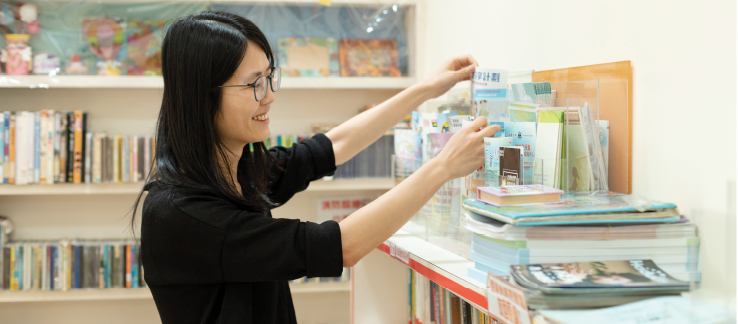
Shining the light of hope
In 2016, Mavis joined the Hong Kong Family Welfare Society as a social worker for divorced families, where she continues to work today. “We provide counseling and assistance for couples every step of the way, whether they’re trying to keep their marriage together, or going through a divorce, or dealing with a custody battle,” Mavis explains. Her care and concern are almost visible. “My goal is to provide a safe space for them to express themselves, deal with difficult emotions, and work through problems in a healthy way.”

When asked how she manages the emotional toll of her work, Mavis reflects for a while before answering. “I have to keep reminding myself of what I can be grateful for. The little things that brighten my day. The incremental improvements my clients make. That’s what gives me courage to face such difficult situations every day.”
She sees her experience at HKUST – both as a student and as a coordinator – as highly instrumental to her work today. It taught her invaluable communication, leadership, and conflict resolution skills. “The mentoring work I did with HKUST Connect benefited me greatly, just as all teachers learn from their students.” She adds, “Also, my time as an engineering student helped me communicate with men more easily. At the Society, we have cell groups for fathers who’ve lost custody of their children. They find it difficult to express their emotions, so I help them communicate in ways they’re more comfortable with.”
Being someone who cares deeply about the community, Mavis has not gone through these experiences unscathed. “My perspective of the world has changed,” she remarks. “When I was young, I thought I could save the world. I saw things as simply good or bad. Now I understand the complexity of what it is to be human. I’ve seen how two people can have completely different views of the same issue, how love can be intertwined with hate, how both partners are responsible for every marital problem, and how couples who want a divorce still miss their partners afterwards.”
Her understanding of marriage has also changed. “With the rise of individualism, people are finding it harder than ever to compromise in their relationships. Yet, independence is still important in every marriage – it’s a delicate, fragile balance. I think people often underestimate the work it takes to have a happy marriage.” Relating these lessons to her own marriage, she adds, “When I’m angry, I ask myself which is more important: my relationship with my husband or the argument I’m having? I try to sit down and talk things through after expressing my feelings. I want to show my husband that I treasure our marriage.”
Through it all, one thing holds true for Mavis: the importance of positive thinking. “No matter what we’ve gone through and what we want to achieve, we have to cultivate an ability within ourselves to see the good in all things and to always find a way forward.”







